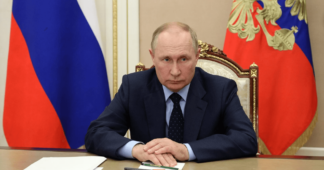Oct 4, 2022
Ukrainian President Volodymyr Zelensky on Tuesday signed a decree that ruled out any talks with Russian President Vladimir Putin, declaring they would be an “impossibility.”
The decree was first put forward by the National Security and Defense Council of Ukraine. According to the Ukrainian newspaper Ukrainska Pravda, the decree states “the impossibility of holding negotiations with the president of the Russian Federation Vladimir Putin.”
The move formalized comments that Zelensky made on Friday following Putin’s approval of annexing four Ukrainian territorites. “He does not know what dignity and honesty are. Therefore, we are ready for a dialogue with Russia, but with another president of Russia,” Zelensky said.
Responding to Zelensky’s move, the Kremlin said it would wait until he changes his position or until there’s a new president in Kyiv to hold talks. “We will now wait either until the incumbent Ukrainian president changes his position, or until there is another president in Ukraine who will change his position for the sake of the Ukrainian people,” Peskov said.
During his speech Friday, Putin said he was open to talks with Ukraine but said the status of the territories Russia is annexing is not up for discussion. “We call on the Kyiv regime to immediately cease fire and all hostilities; to end the war it unleashed back in 2014 and return to the negotiating table,” he said.
“We are ready for this, as we have said more than once. But the choice of the people in Donetsk, Luhansk, Zaporizhzhia, and Kherson will not be discussed,” Putin added.
The US has shown no signs of supporting a diplomatic solution and the Biden administration has no plans to back down on their support for Ukraine despite the risk of provoking Moscow.
We remind our readers that publication of articles on our site does not mean that we agree with what is written. Our policy is to publish anything which we consider of interest, so as to assist our readers in forming their opinions. Sometimes we even publish articles with which we totally disagree, since we believe it is important for our readers to be informed on as wide a spectrum of views as possible.











